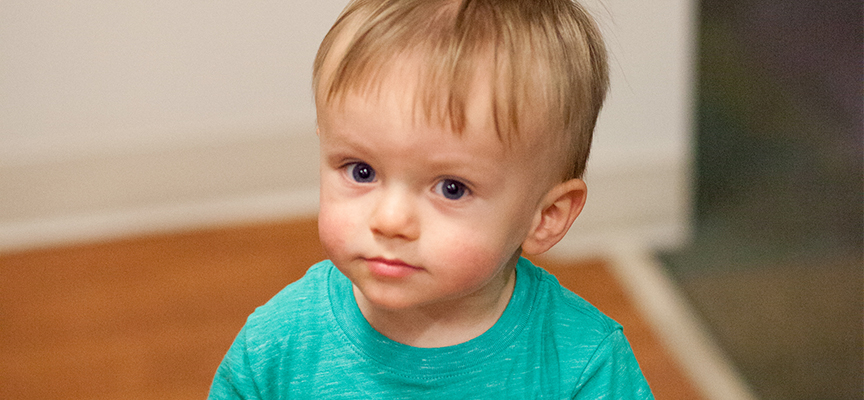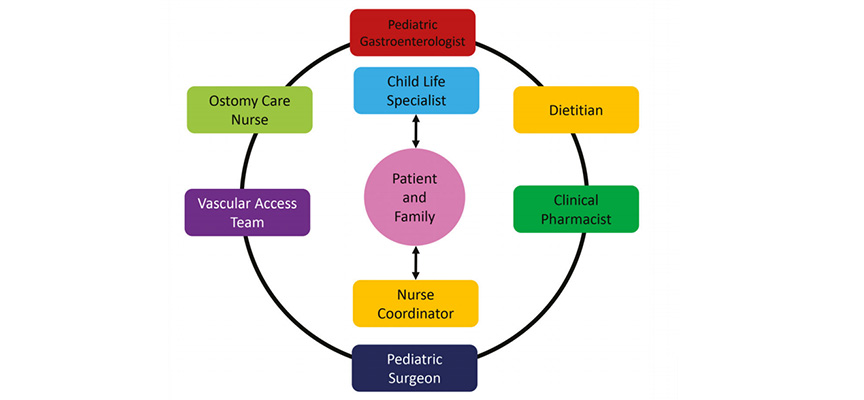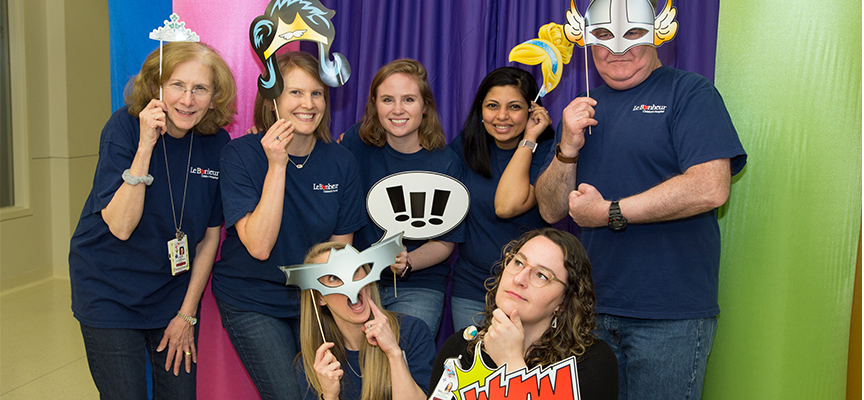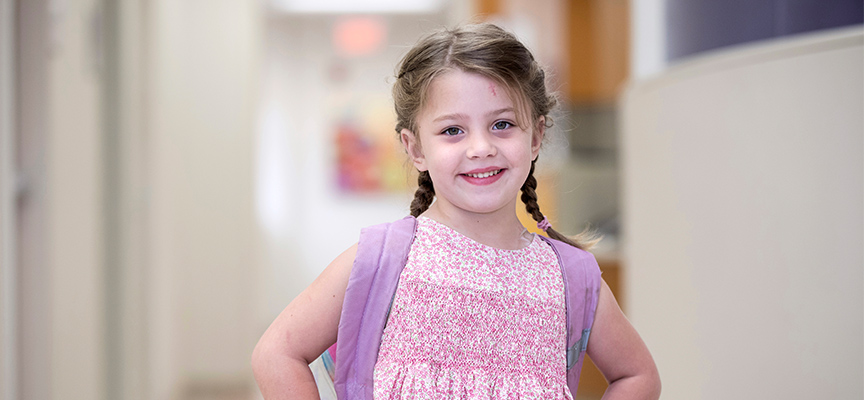The Children’s Intestinal Rehabilitation Clinic at Le Bonheur (CIRCLe) was established in 2007 and is a multidisciplinary and interprofessional team representing pediatric gastroenterology and surgery, neonatology, clinical pharmacy, clinical nutrition (dietitians) and nursing.
What is CIRCLe?
CIRCLe stands for Children’s Intestinal Rehabilitation Clinic at Le Bonheur. It is a specialized clinic for children with gastrointestinal issues leading to problems with nutrition. A child being seen at CIRCLe may have had some part of their gut surgically removed, may receive nutrition through a vein catheter or may receive formula through a feeding tube.

Why Le Bonheur Children's
The primary goal of CIRCLe is to standardize and optimize the clinical management of patients with intestinal failure. The team does this through an evidence‐based, integrated and interprofessional approach to patient care.
Intestinal failure patients in the community are managed through the CIRCLe clinic. The CIRCLe team also has a monthly conference that brings the team together to discuss management of all intestinal failure patients, inpatient and outpatient, and their progress toward intestinal rehabilitation. Research endeavors are directed toward altering the progression of intestinal failure through innovative therapies, improved nutrient absorption and reduced complications.
Common Diagnoses/Conditions
Short bowel syndrome/Short gut syndrome: Condition where the intestinal length is shorter due to surgical removal of diseased/non‐functional intestines. Due to this, the surface area of intestinal lining is reduced and may lead to poor absorption of nutrition affecting growth. This can also lead to rapid transit of intestinal contents leading to diarrhea and loss of fluids.
Gastroschisis: A condition where an infant is born with part or all intestines outside the abdominal cavity due to a defect/failure to close of the anterior abdominal wall. After birth, the intestines are surgically replaced back within the abdominal cavity. The exposed intestines may or may not be viable/functional. Additionally, surgical removal of the non‐viable parts of intestine may lead to short bowel.
Necrotizing enterocolitis (NEC): Condition that causes parts of the intestines to become damaged, nonfunctional due to severe infection. The damaged/non‐viable parts of intestines often require surgical removal.
Intestinal atresia: Condition where parts of intestine are not completely formed causing the intestines to narrow (stenosis) or be occluded completely in certain areas, preventing normal forward movement of intestinal contents. These areas of atresia often require removal by surgery to establish continuity of the intestines.
Hirschsprung disease: A condition where a part of the intestines is missing a specific nerve cell (ganglion cell) that is required for normal motility (forward movement) and ultimately expulsion of intestinal contents in the form of stool/feces. The part of the intestines that is missing these nerve cells does not function properly and at times may require removal by surgery. Patients with long‐segment colonic, total colonic, or intestinal Hirschsprung disease may have difficulties with nutrient absorption and growth.
Le Bonheur CIRCLe Team

Pediatric Gastroenterology: A pediatric gastroenterologist is a pediatrician who completed further training for the treatment of conditions of the gastrointestinal tract of children. These include diseases of the stomach, small and large intestine, liver, gall bladder and pancreas. Closely related to this is the management of nutrition in children. As part of the team, the pediatric gastroenterologist assures that we are meeting the goals for growth. Pediatric gastroenterologists are able to use their knowledge of how the gastrointestinal tract works in order to maximize medical therapy. The pediatric gastroenterologists on the CIRCLe team are Mark R. Corkins MD, CNSC, FASPEN, AGAF, FAAP, and Linda Lazar, MD.
Pediatric Surgery: Pediatric surgeons are specially trained to perform surgery for a wide variety of conditions that may affect infants and children, including intestinal atresia, gastroschisis, necrotizing enterocolitis, and many other problems. For patients with missing or damaged intestine, which can happen before or after birth, pediatric surgeons may remove, reconnect, or modify the intestine to improve or allow feeding. We sometimes place tubes in the stomach or intestine to assist with feeding.
Nurse Coordinator: The nurse coordinator’s goal is to help coordinate the provision of care to your child once discharged from the hospital. The coordinator communicates with home care providers, receives information from those providers to share with the members of the CIRCLe Team, and trouble shoots problems that become barriers to your ability to care for your child at home. The coordinator is an advocate for you to obtain what is needed to care for your child at home. The coordinator meets with families well before their planned discharge and schedules follow up appointments when your child is ready to go home.
Pediatric Dietitians: Pediatric dietitians are trained in assessing nutrient needs and growth of infants and children and making recommendations on advancement of formula feedings, table foods and adjustment of intravenous feedings. In intestinal rehabilitation, the dietitian works to help maximize intestinal adaptation by adjusting nutrient complexity as well as rate and volume of formula feedings. The intestinal rehabilitation dietitian also works with families to provide appropriate table foods and drinks to help the child grow and prevent excessive stooling.
Clinical Pharmacists: The clinical pharmacists on the CIRCLe Team are primarily responsible for managing your child’s parenteral nutrition therapy, which is most commonly called PN or TPN (for total parenteral nutrition). In addition, the clinical pharmacists continually review your child’s medication regimen to make sure the medicine is appropriate and effective with only minimal side effects.

Research Coordinator: Le Bonheur strives to stay up to date with most current evidence based practices. Our research coordinator helps to enroll willing patients and collect data to help provide the best care possible.
Child Life Specialist: Patients in the CIRCLe clinic have faced a variety of stressors due to lengthy hospital admissions, extensive treatments, and recurrent clinic visits. The child life specialist promotes positive coping and provides normalization to patients and families coming to CIRCLE clinic through play, procedural support, and emotional support. The goal is to meet patients and families where they are, providing comfort and support throughout their medical journey.
Wound Care Nurse: The role of a wound care nurse is to provide consultation services and/or care for the patient population with wounds, ostomies or those with conditions contributing to continence issues, such as Spina Bifida. In addition, the wound care nurse also assists in the management, care and education of newly placed gastrostomy tubes. The wound care nurse works with families and physicians on an inpatient and outpatient basis, working in a collaborative fashion to provide education, treatments and referrals to and for families with the intent of the best patient outcomes.
Case Manager: Our case manager works with families and their insurance to ensure patients are receiving needed supplies such as formula, wound care and g-tube supplies.
Social Worker: Due to complexity of cases, our social worker works directly with families to assist with needs and provide resources such as enrolling in therapies, food assistance programs, arranging FedExFamilyHouse stays and transportation to appointments.
Your First Visit
During your first visit to The Children’s Intestinal Rehabilitation Clinic at Le Bonheur, we will take a detailed medical history. You will also meet with a registered nurse, registered dietitian, physician and pharmacist. Please bring your medical records from outside facilities, a list of medications and your insurance cards.
Patient Highlight: Mollie Pounders

Throughout her pregnancy, Jessica Pounders was monitored closely by Le Bonheur’s Fetal Center due to her daughter Mollie’s gastroschisis diagnosis. After she was born, Mollie spent the first six months of her life at Le Bonheur in both the Neonatal Intensive Care Unit (NICU) and on the infant toddler floor. During that time, Mollie was diagnosed with short bowel syndrome, a condition in which the body is not able to properly absorb nutrients from food due to intestinal issues.
“Le Bonheur's nurses and doctors have been such a huge support for our family. Whether it has been a long hospital stay, surgery or clinic appointment, they have never failed to show up for us in every way possible,” said Jessica. “Having traveled with Mollie to other hospitals out of state, I can honestly say Le Bonheur's care and dedication to patients are unmatched. We are forever grateful.”
Mollie is now five years old and has progressed tremendously the past two years. Although she still requires specialized care and therapies, she is entering Kindergarten, has learned ballet and tap dancing, plays baseball and wants to try gymnastics. She doesn’t let her diagnosis hold her back.
When asked what advice she would give to other parents, Jessica said, “To other parents, the first few years are hard and scary. I know it doesn’t seem like it will ever get easier but it does. Trust the journey you’re on, get support and have faith.”




